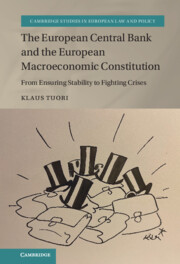 The European Central Bank and the European Macroeconomic Constitution
The European Central Bank and the European Macroeconomic Constitution Book contents
- The European Central Bank and the European Macroeconomic Constitution
- Cambridge Studies in European Law and Policy
- The European Central Bank and the European Macroeconomic Constitution
- Copyright page
- Contents
- Figures
- Series Editors’ Preface
- Preface and Acknowledgements
- Abbreviations
- 1 Introduction: A Supranational Central Bank as a Subject
- Part I The ECB as the Central Bank of the European Macroeconomic Constitution
- Part II Crises, ECB Measures and the Macroeconomic Constitution
- Part III The ECB from a Central Bank of Stability to a Central Bank of Crisis
- 11 The Fate of the European Macroeconomic Constitution
- 12 The Objectives for the ECB and the Macroeconomic Constitution Going Forward
- Epilogue: Where Do We Go from Here?
- Bibliography
- Index
11 - The Fate of the European Macroeconomic Constitution
from Part III - The ECB from a Central Bank of Stability to a Central Bank of Crisis
Published online by Cambridge University Press: 15 September 2022
- The European Central Bank and the European Macroeconomic Constitution
- Cambridge Studies in European Law and Policy
- The European Central Bank and the European Macroeconomic Constitution
- Copyright page
- Contents
- Figures
- Series Editors’ Preface
- Preface and Acknowledgements
- Abbreviations
- 1 Introduction: A Supranational Central Bank as a Subject
- Part I The ECB as the Central Bank of the European Macroeconomic Constitution
- Part II Crises, ECB Measures and the Macroeconomic Constitution
- Part III The ECB from a Central Bank of Stability to a Central Bank of Crisis
- 11 The Fate of the European Macroeconomic Constitution
- 12 The Objectives for the ECB and the Macroeconomic Constitution Going Forward
- Epilogue: Where Do We Go from Here?
- Bibliography
- Index
Summary
The chapter analyses the fate of the constitutional principles of the European Macroeconomic Constitution after the recurring crises. The measures by the ECB stretched the principles to the limits and beyond. The objectives of internal market and price stability fared relatively well, but the principle of open market economy less so. However, the institutional choices and safeguards were all seriously altered, where the prohibition of central bank financing and Member States responsibility for sound fiscal policy were among the key principles that were the most fundamentally transformed. This, apart from the concerns about the constitutionality of individual measures, raises fundamental questions about the European Macroeconomic Constitution. The accountability and even legitimacy of the ECB relied on its unique position as a central bank of an economic constitution. It empowered it, gave it independence, but also constrained and controlled it. The chapter argues that the preconditions for an independent expert role of the ECB have been challenged by its measures and the inability of the judicial review to sustain sufficient boundaries. Consequently, the accountability and legitimacy of the ECB have been compromised, and with that also the rule of law with regard to the EMU is under threat.
Keywords
- Type
- Chapter
- Information
- The European Central Bank and the European Macroeconomic ConstitutionFrom Ensuring Stability to Fighting Crises, pp. 261 - 273Publisher: Cambridge University PressPrint publication year: 2022


